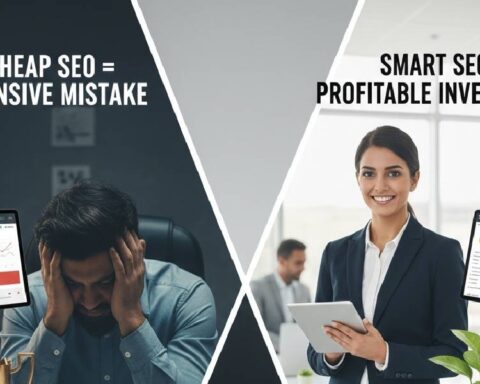In the digital marketplace, visibility is everything. Big brands may have million-dollar marketing budgets, but small businesses still find ways to compete—and even outperform them—through strategic, data-driven SEO. This “David vs. Goliath” dynamic isn’t just about resources; it’s about precision, creativity, and adaptability.
For small business owners in 2025, mastering search engine optimisation isn’t optional—it’s the single most cost-effective way to gain exposure, attract qualified leads, and convert local customers.
Why Big Budgets Don’t Always Win
Large corporations dominate traditional advertising because they can afford massive campaigns across multiple platforms. However, in SEO, success isn’t bought—it’s earned. Search engines reward relevance, authority, and user experience, not ad spend.
That’s where small businesses have the advantage. With focused strategies and consistent optimisation, they can rank for highly targeted keywords, appear in local searches, and capture the attention of customers who are ready to buy.
SEO is the great equaliser—it gives smaller players the tools to challenge market giants and build strong online visibility over time.
Understanding the Power of SEO
Search engine optimisation (SEO) is about improving a website’s visibility on platforms like Google. It includes technical setup, keyword research, content strategy, and link building. When done right, SEO drives consistent, organic traffic without relying on paid ads.
Professional SEO services focus on creating authority in your niche. They help small businesses appear where potential customers are searching, making every click more valuable.
Key aspects of SEO include:
- On-page optimisation: Improving site content, meta descriptions, and structure.
- Technical SEO: Ensuring fast loading times, mobile responsiveness, and proper indexing.
- Off-page SEO: Building backlinks and online credibility.
- Local SEO: Targeting nearby customers searching for relevant services.
For small businesses, a tailored SEO strategy ensures that every dollar spent goes toward measurable growth.
The Small Business Advantage
Unlike big brands that need to maintain thousands of web pages, small businesses can move faster and focus their energy on what matters most—their customers.
Here’s why smaller companies often outperform large corporations in SEO:
- Flexibility: They can adapt quickly to algorithm changes and market shifts.
- Niche targeting: They can dominate specific long-tail keywords with less competition.
- Authenticity: Their content tends to feel more personal and community-driven.
- Local relevance: They can optimise for “near me” searches, something national chains often struggle to localise.
These advantages create opportunities for small businesses to establish credibility, rank for local searches, and capture leads efficiently.
How Smart SEO Beats Big Budgets
1. Precision Targeting
Small businesses don’t need to chase every keyword. Instead, they can target search terms directly aligned with customer intent. For example, a local bakery doesn’t need to rank for “best desserts in the world.” It only needs to appear when someone searches “custom birthday cakes in Melbourne.”
2. Content That Converts
Quality trumps quantity. Big brands often publish generic blog posts, but small businesses can focus on high-value content—guides, FAQs, and case studies—that address customer pain points directly. This approach increases dwell time and engagement, which improves SEO performance.
3. Local Optimisation
Smart SEO strategies prioritise local visibility through Google Business Profiles, customer reviews, and local backlinks. For a small company, this can mean dominating the “map pack” results, which receive the majority of clicks in location-based searches.
4. Speed and Consistency
Small teams can implement changes faster. Whether it’s updating metadata, publishing fresh content, or improving site speed, execution speed matters. Search engines reward consistent improvement.
5. Building Trust
Search engines favour credibility. Positive reviews, secure websites (HTTPS), and authoritative backlinks build trust—something smaller businesses can achieve by maintaining authenticity and personal connection with their customers.
Affordable SEO for Long-Term Growth
One of the biggest misconceptions is that SEO requires massive budgets. In truth, sustainable, affordable SEO for small businesses delivers impressive long-term results without breaking the bank.
Affordable doesn’t mean cheap or ineffective—it means strategic. By focusing on achievable goals, realistic timelines, and local keywords, small businesses can generate consistent traffic and grow steadily.
Key benefits include:
- Cost-efficiency: SEO compounds over time, unlike paid ads that stop delivering when spending stops.
- Lead quality: Organic visitors are often more qualified and engaged.
- Longevity: Once you rank, maintaining visibility is easier with minimal upkeep.
- Scalability: SEO results can grow alongside your business.
A smart SEO agency will prioritise measurable metrics like conversions, engagement, and keyword rankings rather than vanity numbers.
Common SEO Mistakes Small Businesses Should Avoid
While SEO can be a game-changer, common mistakes can hold small businesses back:
- Neglecting mobile optimisation: Most users search on mobile devices, so your site must be fast and responsive.
- Skipping analytics: Without tracking data, it’s impossible to measure performance accurately.
- Focusing only on keywords: SEO is also about user experience, design, and site performance.
- Expecting instant results: SEO builds momentum gradually—it’s a marathon, not a sprint.
Avoiding these pitfalls ensures your SEO efforts lead to sustainable growth.
Future SEO Trends Small Businesses Should Watch
As search algorithms become smarter, SEO strategies must evolve. Here are emerging trends shaping 2025:
- AI-driven optimisation: Artificial intelligence tools help predict keyword trends and user intent.
- Voice search: More users are using conversational searches via smart devices.
- E-E-A-T (Experience, Expertise, Authority, Trust): Google increasingly prioritises credible and experience-backed content.
- Visual SEO: Image optimisation and video content are growing in importance.
- User experience (UX): Engagement signals—clicks, time on page, and interaction—are key ranking factors.
Small businesses that embrace these innovations early will stay ahead of competitors, regardless of size.
Conclusion
The battle between small businesses and large corporations isn’t about who has the biggest marketing budget – it’s about who uses strategy more effectively. With the right SEO approach, even a modest investment can outperform large-scale campaigns by targeting the right audience and delivering genuine value.
By leveraging professional SEO services and focusing on affordable SEO for small businesses, owners can create sustainable online visibility that brings long-term growth. In 2025, success belongs not to those who spend the most—but to those who optimise the smartest.
Read More Gorod








